Yom HaAliyah
Yom HaAliyah (Aliyah Day) (Hebrew: יום העלייה) is an Israeli national holiday celebrated annually according to the Jewish calendar on the tenth of the Hebrew month of Nisan to commemorate the Jewish people entering the Land of Israel as written in the Hebrew Bible, which happened on the tenth of the Hebrew month of Nisan (Hebrew: י' ניסן).[1] The holiday was also established to acknowledge Aliyah, immigration to the Jewish state, as a core value of the State of Israel, and honor the ongoing contributions of Olim, Jewish immigrants, to Israeli society. Yom HaAliyah is also observed in Israeli schools on the seventh of the Hebrew month of Cheshvan. [2]
| Yom HaAliyah יום העלייה | |
|---|---|
 Joshua Leading the Israelites Across the Jordan River on the 10th of Nisan | |
| Official name | Yom HaAliyah (Aliyah Day) Hebrew: יום העלייה |
| Observed by | State of Israel |
| Significance | Celebrating Aliyah as a core value of the Jewish People and honoring the ongoing contributions of Olim to Israeli society. On the tenth of the Hebrew month of Nisan according to the Bible, Joshua led the Israelites carrying the Ark of the Covenant across the Jordan River at Gilgal into the Promised Land. |
| Begins | Nisan 10 (Hebrew calendar) & Observed in schools Cheshvan 7 (Hebrew calendar) |
| Date | 10 Nisan national holiday & observed in schools 7 Cheshvan |
| 2020 date | Sunset, 3 April – nightfall, 4 April (hist.) Sunset, 24 October – nightfall, 25 October (obs.) |
| 2021 date | Sunset, 22 March – nightfall, 23 March (hist.) Sunset, 12 October – nightfall, 13 October (obs.) |
| 2022 date | Sunset, 10 April – nightfall, 11 April (hist.) Sunset, 31 October – nightfall, 1 November (obs.) |
| 2023 date | Sunset, 31 March – nightfall, 1 April (hist.) Sunset, 21 October – nightfall, 22 October (obs.) |
| Frequency | Annual |
The opening clause of the Yom HaAliyah Law states in Hebrew:
מטרתו של חוק זה לקבוע יום ציון שנתי להכרה בחשיבותה של העלייה לארץ ישראל כבסיס לקיומה של מדינת ישראל, להתפתחותה ולעיצובה כחברה רב־תרבותית, ולציון מועד הכניסה לארץ ישראל שאירע ביום י׳ בניסן.[3]
English translation:
The purpose of this law is to set an annual holiday to recognize the importance of Jewish immigration to the Land of Israel as the basis for the existence of the State of Israel, its development and design as a multicultural society, and to mark the date of entry into the Land of Israel that happened on the tenth of Nisan.
History
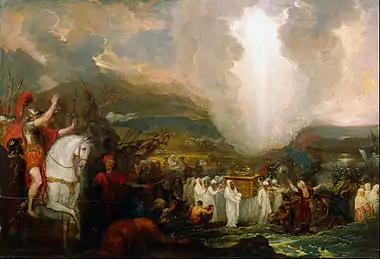
Yom HaAliyah, as a modern holiday celebration, began in 2009 as a grassroots community initiative and young Olim self-initiated movement in Tel Aviv, spearheaded by the TLV Internationals organization of the Am Yisrael Foundation.[4][5] On June 21, 2016 the Twentieth Knesset voted in favor of codifying the grassroots initiative into law by officially adding Yom HaAliyah to the Israeli national calendar.[6] The Yom HaAliyah bill[7] was co-sponsored by Knesset members from different parties in a rare instance of cooperation across the political spectrum of the opposition and coalition.[8] The key Knesset parliamentarians who initially worked on the final successful version of the Yom HaAliyah bill were Miki Zohar of Likud, Hilik Bar of Israeli Labor Party, and Michael Oren of Kulanu.[9] There were previous failed attempts in other Knesset sessions to create similar legislation, none of which were related to the ultimate successful creation of the holiday, namely Knesset members Avraham Neguise, Yoel Razvozov, Robert Ilatov, and Yaakov Katz. [10][11]
Significance
The original calendar date chosen for Yom HaAliyah, the tenth of Nisan, is laden with symbolism. Although a modern holiday created by the Knesset of Israel, the tenth of Nisan is a date of religious significance for the Jewish People as recounted in the Hebrew Bible and in traditional Jewish thought.[11]
Biblical
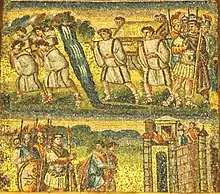
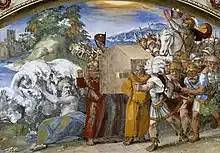
On the tenth of Nisan, according to the biblical narrative in the Book of Joshua, Joshua leading the Israelites crossed the Jordan River at Gilgal into the Promised Land while carrying the Ark of the Covenant. It was thus the first documented "mass Aliyah." On that day, God commanded the Israelites to commemorate and celebrate the occasion by erecting twelve stones with the text of the Torah engraved upon them. The stones represented the entirety of the Jewish nation's twelve tribes and their gratitude for God's gift of the Land of Israel (Hebrew: אֶרֶץ יִשְׂרָאֵל, Modern: Eretz Yisrael, Tiberian: ʼÉreṣ Yiśrāʼēl) to them. [12] The 10th of Nisan is also significant as it was the first Shabbat HaGadol that took place five days before the Israelites left Egypt beginning The Exodus. This is also the date that Moses's sister Miriam died and according to the Biblical narrative her well that miraculously traveled with the Israelites through the desert dried up (Numbers 20:1–2).[13][14]
The tenth of the Hebrew month of Nisan, which is the first month according to the ordering of the Hebrew calendar, is referenced in association with Aliyah multiple times within the Biblical text.
And Moses and the elders of Israel commanded the people, saying, Observe all of the commandment that I command you this day. And it will be, on the day that you cross the Jordan to the Land the Lord, your God, is giving you, that you shall set up for yourself huge stones, and plaster them with lime. When you cross, you shall write upon them all the words of this Torah, in order that you may come to the land which the Lord, your God, is giving you, a land flowing with milk and honey, as the Lord, God of your forefathers, has spoken to you. -Deuteronomy 27:1–3[15]
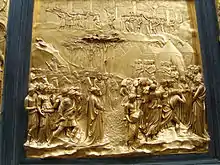
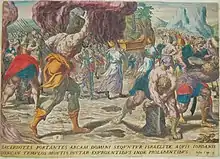
And it was after the death of Moses the servant of the Lord, that the Lord said to Joshua the son of Nun, Moses' minister, saying: Moses my servant has died; and now arise cross this Jordan, you and all this nation, to the land which I give the children of Israel. Every place on which the soles of your feet will tread I have given to you, as I have spoken to Moses. From this desert and Lebanon to the great river, the Euphrates, all the land of the Hittites to the great sea westward shall be your boundary. No man shall stand up before you all the days of your life; as I was with Moses, so shall I be with you. I will not weaken My grasp on you nor will I abandon you. Be strong and have courage; for you will cause this nation to inherit the land that I have sworn to their ancestors to give to them. Just be strong and very courageous to observe and do in accordance with all of the Torah that Moses My servant has commanded you. Do not stray therefrom right or left, in order that you succeed wherever you go. This book of the Torah shall not leave your mouth; you shall meditate therein day and night, in order that you observe to do all that is written in it, for then will you succeed in all your ways and then will you prosper. Did I not command you, be strong and have courage, do not fear and do not be dismayed, for the Lord your God is with you wherever you go. And Joshua commanded the officers of the nation, saying: Go through the midst of the camp and command the nation saying: Prepare provision for yourselves, for in another three days you will cross this Jordan to come and inherit the land that the Lord your God is giving you to inherit. And to the Reubenites and the Gadites and the half tribe of Manasseh, Joshua said, saying: Remember the word that Moses the servant of the Lord commanded you saying: The Lord your God is giving you rest and has given you this land. Your wives, your children, and your cattle shall settle in the land that Moses gave you on this side of the Jordan, and you, all the warriors, shall cross over armed before your brothers, and you shall help them. Until the Lord gives your brothers rest as He has given you, and they too shall inherit the land that the Lord your God gives them. You will then return to the land of your inheritance which Moses the servant of the Lord gave you on this side of the Jordan towards the rising of the sun, and you will inherit it. And they answered Joshua saying: All that you have commanded us we shall do and wherever you send us we shall go. Just as we obeyed Moses in everything, so shall we obey you. Only that the Lord your God be with you as He was with Moses. Every man that shall rebel against your words and will not listen to your commands in all that you order him shall be put to death. Only be strong and have courage. -Joshua 1:1-18 [16]
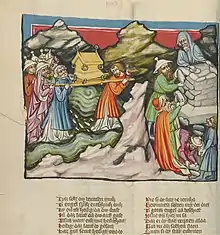
And Joshua rose up early in the morning, and they moved from Shittim and came to the Jordan, he and all the People of Israel; and they lodged before they crossed over. And it was at the end of three days, that the officers went through the midst of the camp. And they commanded the people, saying: When you see the Ark of the Covenant of the Lord your God, and the priests the Levites bearing it, then you shall move from your place and go after it. But there shall be a distance between you and it, just two thousand cubits by measure; do not come near it, that you may know the way by which you will go; for you have not passed this way before. And Joshua said to the people; Prepare yourselves, for tomorrow the Lord will do wonders among you. And Joshua said to the priests, saying: Carry the Ark of the Covenant, and pass before the people. And they carried the Ark of the Covenant, and went before the people. And the Lord said to Joshua: This day I will begin to make you great in the sight of all Israel, that they may know that as I was with Moses, so will I be with you. And you shall command the priests that bear the Ark of the Covenant, saying, When you come to the edge of the waters of the Jordan, you shall stand still in the Jordan. And Joshua said to the Children of Israel, Come here, and hear the words of the Lord your God. And Joshua said, By this you shall know that the living God is in your midst, and He will certainly drive out the Canaanites, and the Hittites, and the Hivites, and the Perizzites and the Girgashites, and the Amorites, and the Jebusites from before you. Behold, the Ark of the Covenant of the Lord of all the earth is crossing ahead of you in the Jordan. And now take for yourselves twelve men from the tribes of Israel, a man for every tribe. And it shall be, when the soles of the feet of the priests that bear the Ark of the Lord, Lord of all the earth, rest in the waters of the Jordan, the waters of the Jordan shall be cut off, the waters that come down from above, shall stand in one heap. And it was, when the people moved from their tents, to cross the Jordan, and the priests bearing the Ark of the Covenant were before the people. And when the bearers of the Ark came to the Jordan, and the feet of the priests that bore the Ark were dipped in the edge of the water, and the Jordan overflows all its banks all the time of harvest. And the waters which came down from above stood and rose up in one column, very far from Adam, the city which is beside Zarethan; and those that descended to the sea of the plain, the Salt Sea, were completely cut off, and the people passed over opposite Jericho. And the priests that bore the Ark of the Covenant of the Lord stood firm arranged on the dry land in the midst of the Jordan, and all Israel passed over on dry ground, until the whole nation had completely passed over the Jordan. -Joshua 3:1-17 [17]
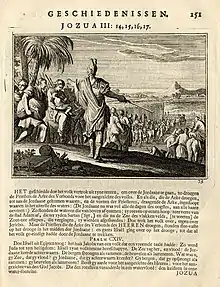
And it was when all the nation had completely passed over the Jordan, the Lord spoke to Joshua, saying, Take to yourselves twelve men from the people, a man from every tribe. And command them saying, Take to yourselves from here out of the midst of the Jordan, out of the place where the priests' feet stood firm, twelve stones, and you shall carry them over with you, and leave them in the lodging place, where you shall lodge this night. And Joshua called the twelve men, whom he had prepared of the Children of Israel, a man from every tribe. And Joshua said to them, Pass before the Ark of the Lord your God into the midst of the Jordan, and lift up every man of you a stone upon his shoulder, according to the number of the tribes of the Children of Israel. That this may be a sign among you, that when your children ask in time to come, saying, What are these stones for you? Then you shall say to them, That the waters of the Jordan were cut off before the Ark of the Covenant of the Lord; when it passed over the Jordan, the waters of the Jordan were cut off; and these stones shall be for a memorial to the Children of Israel forever. And the Children of Israel did as Joshua commanded, and took up twelve stones out of the midst of the Jordan, as the Lord had spoken to Joshua, according to the number of the tribes of the Children of Israel, and carried them over with them to the place where they lodged, and laid them there. And Joshua set up twelve stones in the midst of the Jordan, in the place where the feet of the priests who bore the Ark of the Covenant stood; and they have been there to this day. And the priests that bore the Ark stood in the midst of the Jordan, until everything was finished that the Lord commanded Joshua to speak to the people, according to all that Moses commanded Joshua; and the people hastened and passed over. And it was, when all the people had completely passed over, that the Ark of the Lord passed over, and the priests, in the presence of the people. And the children of Reuben, and the children of Gad, and half the tribe of Manasseh, passed over armed before the Children of Israel, as Moses had spoken to them. About forty thousand armed for war passed over before the Lord to battle, to the plains of Jericho. On that day the Lord made Joshua great in the sight of all Israel, and they feared him, as they had feared Moses, all the days of his life. And the Lord said to Joshua, saying, Command the priests that bear the Ark of the testimony, that they come up out of the Jordan. And Joshua commanded the priests, saying, Come up out of the Jordan. And it was, when the priests that bore the Ark of the Covenant of the Lord came up out of the midst of the Jordan, that as soon as the soles of the priests' feet were lifted up to the dry land, the waters of Jordan returned to their place, and flowed over all its banks, as before. And the people came up out of the Jordan on the tenth day of the first month, and encamped in Gilgal, in the east border of Jericho. And these twelve stones, which they took out of the Jordan, Joshua set up in Gilgal. And he spoke to the Children of Israel, saying, When your children ask their fathers in time to come, saying, What are these stones? Then, you shall let your children know, saying, Israel came over this Jordan on dry land. For the Lord your God dried up the waters of the Jordan from before you, until you passed over, as the Lord your God did to the Red Sea, which He dried up from before us, until we passed over. That all the people of the earth might know the power of the Lord, that it is mighty; that you might fear the Lord your God forever. -Joshua 4:1-24 [18]
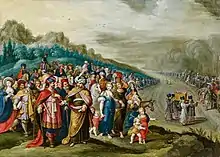
Jewish people
_-_Museum_Boijmans_Van_Beuningen.jpg.webp)
Entering the Land of Israel en masse has been significant for the Jewish People both historically and in modern times. Besides the individual religious implication of those Torah laws that can only be followed in Israel as opposed to when Jews are living around the world, there are traditional precepts that uniquely effect the Jewish People as an entire nation after having made Aliyah.[19]
For you are crossing the Jordan, to come to possess the Land which the Lord, your God, is giving you, and you shall possess it and dwell in it. And you shall keep to perform all the statutes and ordinances that I am setting before you today.
— Deuteronomy 11:31–32[20]
When the Israelites crossed the Jordan River into the Land of Israel for the first time on the 10th of Nisan, according to traditional Jewish teachings they took upon themselves a special dimension to the concept of "arevut" or "mutual responsibility". [21] Arevut is known also by the Talmudic Hebrew/Aramaic maxim mentioned in Shevuot 39a, "Kol Yisrael Areivim Zeh baZeh", "כל ישראל ערבים זה בזה", meaning "All Jews are Responsible for One Another". [22] The Maharal of Prague, Rabbi Judah Loew ben Bezalel, comments on the Talmudic statement that the Israelites were not truly responsible for one another until after they had crossed the Jordan. [23] Arevut implies an obligation on all Jews to ensure that other Jews have their spiritual and basic needs taken care of. Simply by virtue of being a Jew living in the Land of Israel, one has an elevated responsibility for the well-being of other Jews.[24] Jews are expected to be a “light unto the nations”, presenting a model of morality and brotherly responsibility. Specifically in terms of "Kol Yisrael", the hope is that other nations around the globe will also see how Jews help each other when living in Israel and will try to do the same for their own people. [25]
Religious
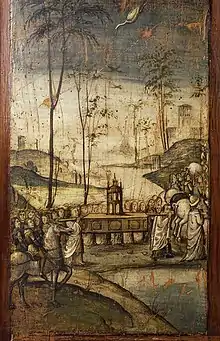
According to Jewish religious tradition, upon making Aliyah by crossing the Jordan River to enter the Land of Israel, Joshua composed the Aleinu prayer thanking God. This idea was first cited in the Kol Bo of the late 14th Century. [26]
</ref> Several medieval commentators noticed that Joshua’s shorter birth name, Hosea, appears in the first few verses of Aleinu in reverse acrostic: ע – עלינו, ש – שלא שם, ו – ואנחנו כורעים, ה – הוא אלוקינו. The Teshuvot HaGeonim, a Geonic responsum, discussed that Joshua composed the Aleinu because although the Israelites had made Aliyah to the Promised Land, they were surrounded by other peoples, and he wanted the Jews to draw a clear distinction between themselves, who knew and accepted the sovereignty of God, and those nations of the world which did not. [27] In the modern era, religious Jews still pray the Aliyah inspired Aleinu three times daily, including on the High Holidays. The Aleinu prayer begins:
It is our duty to praise the Master of all, to exalt the Creator of the Universe, who has not made us like the nations of the world and has not placed us like the families of the earth, who has not designed our destiny to be like theirs, nor our lot like that of all their multitude. [28]
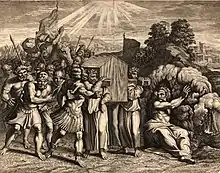
State of Israel
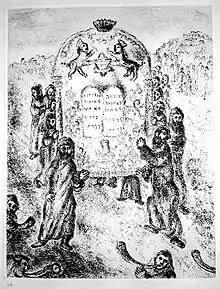
Aliyah (US: /ˌæliˈɑː/, UK: /ˌɑː-/; Hebrew: עֲלִיָּה, "ascent") is the immigration of Jews from the diaspora to the Land of Israel. Also defined as "the act of going up", "making Aliyah" by moving to the Land of Israel is one of the most basic tenets of Judaism and therefore Zionism.[29] The State of Israel's Law of Return gives Jews, and in some cases their descendants, automatic rights regarding residency and Israeli citizenship.
From the modern founding of the State of Israel, honoring Aliyah as a core value of the nation is evident even in the text of the Israeli Declaration of Independence, most profoundly in the opening few lines:
The Land of Israel was the birthplace of the Jewish people. Here their spiritual, religious and political identity was shaped. Here they first attained to statehood, created cultural values of national and universal significance and gave to the world the eternal Book of Books. After being forcibly exiled from their Land, the People kept faith with it throughout their dispersion and never ceased to pray and hope for their return to it and for the restoration in it of their political freedom. Impelled by this historic and traditional attachment, Jews strove in every successive generation to re-establish themselves in their ancient homeland. In recent decades they returned in their masses. Pioneers, immigrants, and defenders, they made deserts bloom, revived the Hebrew language, built villages and towns, and created a thriving community controlling its own economy and culture, loving peace but knowing how to defend itself, bringing the blessings of progress to all the country's inhabitants, and aspiring towards independent nationhood. -Israeli Declaration of Independence
Aliyah as a core value of the State of Israel can be seen in its national anthem, Hatikvah, "The Hope", which was adapted from a poem by the 19th century Jewish poet, Naftali Herz Imber.
As long as in the heart, within, A Jewish soul still yearns, And onward, towards the ends of the east, an eye still gazes toward Zion;
Our hope is not yet lost, The hope two thousand years old, To be a free nation in our land, The land of Zion and Jerusalem.
-Hatikvah
Honoring Aliyah has also been at the core of the State of Israel's religious sector. The Prayer for the Welfare of the State of Israel is a prayer said in many Jewish synagogues on Shabbat and on Jewish holidays, both in Israel and around the globe. The prayer requests divine providence for the State of Israel, its leaders, and that God helps with Aliyah, namely that still exiled Jewish People be gathered back into the Land of Israel.
...Remember our brethren, the whole house of Israel, in all the lands of their dispersion. Speedily bring them to Zion your city, to Jerusalem, dwelling of your name, as it is written in the Torah of your servant Moses: ‘Even if your exiles are at the end of the heavens, the Lord, your God, will gather you from there, and He will take you from there. And the Lord, your God, will bring you to the land which your forefathers possessed, and you too will take possession of it, and He will do good to you, and He will make you more numerous than your forefathers.’ -Prayer for the Welfare of the State of Israel
The prayer was instituted in 1948 by the Sephardic and Ashkenazic Chief Rabbis of the newly formed State of Israel, respectively Rabbi Ben-Zion Meir Hai Uziel and Rabbi Yitzhak HaLevi Herzog with assistance by Nobel laureate Shmuel Yosef Agnon. [30]
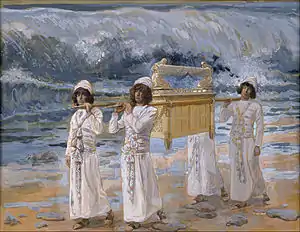
Jewish thought
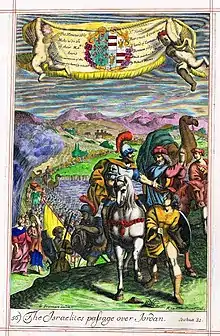
Aliyah is an important Jewish religious concept and a fundamental component of Zionism. For much of Jewish history, the majority of the Jewish People have lived in the diaspora where Aliyah was developed as a national aspiration for the Jewish People. It is enshrined in Israel's Law of Return, which accords any Jew (deemed as such by halakha and Israeli secular law) the legal right to assisted immigration and settlement in Israel, as well as Israeli citizenship.
Someone who "makes Aliyah" is called an "Oleh" (m.; pl. "Olim") or "Olah" (f.; pl. "Olot"). Many religious Jews espouse Aliyah as a return to the Promised Land, and regard it as the fulfillment of God's biblical promise to the descendants of the Hebrew patriarchs Abraham, Isaac, and Jacob. Rabbi Moshe Ben Nachman, also known as Nachmanides or the Ramban, includes making Aliyah in his enumeration of the 613 commandments.[31]
The Hebrew Bible is laden with references to a future when the Jewish People would have a mass return to the Land of Israel. The Bible recounts that when God sent the Jews to exile from the Holy Land approximately 2,500 years ago, He made a promise about the future of Aliyah:
And it shall come to pass that on that day, the Lord shall continue to apply His hand a second time to acquire the rest of His people, that will remain from Assyria and from Egypt and from Pathros and from Cush and from Elam and from Sumeria and from Hamath and from the islands of the sea. -Isaiah 11:11
God promised that one day, He would gather His children from the four corners of the earth, and bring them back home, to the Land of Israel:
And He shall raise a banner to the nations, and He shall gather the lost of Israel, and the scattered ones of Judah He shall gather from the four corners of the earth. -Isaiah 11:12
And the redeemed of the Lord shall return, and they shall come to Zion with song, and with everlasting joy on their heads; gladness and joy shall overtake them; sorrow and sighing shall flee. -Isaiah 51:11
Fear not for I am with you; from the east I will bring your seed, and from the west I will gather you. I will say to the north, "Give," and to the south, "Do not refrain"; bring My sons from afar and My daughters from the end of the earth. -Isaiah 43:5-6 [32]
In the Talmud, at the end of tractate Ketubot, the Mishnah says:
A man may compel his entire household to go up with him to the Land of Israel, but may not compel one to leave.
The discussion on this passage in the Mishnah emphasizes the importance of living in Israel:
One should always live in the Land of Israel, even in a town where the majority of inhabitants are idolaters, but let no one live outside the Land, even in a town most of whose inhabitants are Israelites; for whoever lives in the Land of Israel may be considered to have a God, but whoever lives outside the Land may be regarded as one who has no God.
Sifre says that the mitzvah (commandment) of living in Eretz Yisrael is as important as all the other mitzvot combined. There are many mitzvot such as shmita, the sabbatical year for farming, which can only be fulfilled in the Land of Israel.[33]
According to the traditional Jewish ordering of books of the Tanakh (Old Testament), the very last word of the last book in the original Hebrew (2 Chronicles 36:23) is veya‘al, a jussive verb form derived from the same root as "Aliyah", meaning "and let him go up" (to Jerusalem in the Land of Israel).[34]
As the tenth of Nisan occurs a few days before the Passover holiday, when Israeli schools are not in session, the school system will also honor Aliyah on the seventh of the Hebrew month of Cheshvan. That date is also symbolic as the Torah portion read in synagogues that week, Lekh Lekha, relates the story of how the biblical patriarch Abraham is ordered by God to leave his home, his birthplace, and his family and go up to the Land of Israel. This is also the date that the additional prayer for rain is added into the Amidah, and recited three times a day by Jews in Israel.[35]
Modern
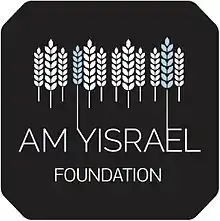
Jay M. Shultz, President of the Am Yisrael Foundation, the driving force behind the creation of the Israeli national holiday Yom HaAliyah,[36] believes that the holiday will enable Jews...
to connect the Biblical historical truth of Joshua crossing the Jordan to our modern practical reality... especially when Jews worldwide are celebrating Passover, and remembering the Exodus, they should take to heart that the final destination of leaving Egypt was entering the Land of Israel. The oft repeated phrase 'L'Shana Haba'ah B'Yerushalayim - Next Year in Jerusalem' should not be said in vain. There has never been an easier time in history for a Jew to live in Israel. It is time for every Jew to come Home. [8]
Although it was not a reoccurring holiday, the first instance of a modern public celebration honoring the idea of Aliyah Day and Jewish immigrants settling the Land of Israel was hosted by Keren HaYesod in Tel Aviv on the second of November 1950.
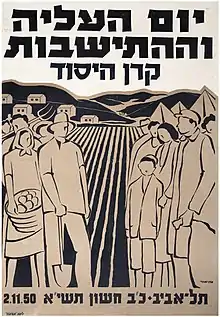
See also
- Public holidays in Israel
- Culture of Israel
- Jewish holidays
- Gathering of Israel
- Atchalta De'Geulah
- Return to Zion
- Jewish diaspora
- Homeland for the Jewish people
- Pre-Modern Aliyah
- Proto-Zionism
- L'Shana Haba'ah B'Yerushalayim
- Law of Return
- Israeli Nationality Law of 1952
- Hebrew calendar
- List of observances set by the Hebrew calendar
- Holy Land
- History of the Jews and Judaism in the Land of Israel
- History of Zionism
- Expulsions and exoduses of Jews
- Jewish exodus from Arab and Muslim countries
- Israeli passport
- Negation of the Diaspora
References
- Atali, Amichai (19 June 2016). "Government to pass new holiday: 'Aliyah Day'". Ynetnews. Retrieved 4 February 2021.
- Yashar, Ari (24 March 2014). "Knesset Proposes Aliyah Holiday Bill". Israel National News. Retrieved 4 February 2021.
- "חוק יום העלייה, התשע"ו- 2016" [Aliyah Day Law, 2016] (PDF) (in Hebrew). 23 June 2016. Retrieved 4 February 2021.
- Rudee, Eliana (29 June 2016). "Yom HaAliyah: They made a day for us!". JNS.org. Retrieved 4 February 2021.
- Lave, Yehuda (25 October 2020). "Which Jewish Holiday is Celebrated Twice a Year?". Retrieved 4 February 2021.
- "New national holiday in Israel". J-Wire. 22 June 2016. Retrieved 4 February 2021.
- "חוק יום העלייה, התשע״ו–2016" [Aliyah Day Law, 2016]. he.wikisource.org (in Hebrew). Retrieved 4 February 2021.
- Klein, Steven (23 June 2016). "Rank and File: Aliyah Day Becomes Official Holiday". Haaretz. Retrieved 4 February 2021.
- Cohen, Justin (22 June 2016). "Israel approves holiday to celebrate contribution of immigrants". Jewish News. Retrieved 4 February 2021.
- Harkov, Lahav (21 June 2016). "It's official: Aliya Day to be a national holiday". The Jerusalem Post. Retrieved 4 February 2021.
- Harkov, Lahav (18 March 2014). "Bill seeks to establish national Aliya Day". The Jerusalem Post. Retrieved 4 February 2021.
- "Yehoshua - Joshua - Chapter 4". Chabad.org. Retrieved 4 February 2021.
- Tervanotko, Hanna K. (2016). Denying Her Voice: The Figure of Miriam in Ancient Jewish Literature. Vandenhoeck & Ruprecht. p. 257. ISBN 978-3647551050.
- van den Bosch, Jan Williem (2016). "Chapter 13 The Well of Miriam and its Mythological Forbears". In Houtman, Alberdina; Kadari, Tamar; Poorthuis, Marcel; Tohar, Vered (eds.). Religious Stories in Transformation: Conflict, Revision and Reception. Brill. ISBN 978-9-00433481-6.
- "Devarim - Deuteronomy - Chapter 27". Chabad.org. Retrieved 4 February 2021.
- "Yehoshua - Joshua - Chapter 1". Chabad.org. Retrieved 4 February 2021.
- "Yehoshua - Joshua - Chapter 3". Chabad.org. Retrieved 4 February 2021.
- "Yehoshua - Joshua - Chapter 4". Chabad.org. Retrieved 4 February 2021.
- "Nitzavim: Mutual responsibility in Eretz Yisrael". Israel National News. Retrieved 4 February 2021.
- "Deuteronomy Chapter 11:31-32". Chabad.org. Retrieved 4 February 2021.
- Zimmerman, Rav Binyamin. "Shiur #20: Arevut and Tokhacha". The Israel Koschitzky Virtual Beit Midrash. Retrieved 4 February 2021.
- Lichtenstein, HaRav Aharon. "Mutual Responsibility in the Jewish State". The Israel Koschitzky Virtual Beit Midrash. Retrieved 4 February 2021.
- Gershuni, Yehuda (1972). "The Torah of Israel and the State". Tradition: A Journal of Orthodox Jewish Thought. 12 (3/4). Retrieved 4 February 2021.
- "All of Israel Are Responsible for One Another". Retrieved 4 February 2021.
- "The phrase "Kol Yisrael arevim zeh la-zeh" means "all Jews (or all the people of Israel) are responsible for one another."". Retrieved 4 February 2021.
- Bick, Rav Ezra. "Shiur #18: Aleinu". The Israel Koschitzky Virtual Beit Midrash. Retrieved 5 February 2021.
- "The Origins of Aleinu". Congregation Anshe Sholom. Retrieved 5 February 2021.
- "Online Siddur with Commentary". Chabad.org. Retrieved 5 February 2021.
- "Introduction - "Aliyah" - the word and its meaning". Archived from the original on 19 December 2009. Retrieved 5 February 2021.
- Hertzog, Rabbi Yitsḥak haLevi (1948). "תפילה לשלום מדינת ישראל" [Prayer for the Welfare of the State of Israel]. OpenSiddur.org (in Hebrew). Retrieved 5 February 2021.
- "Is It A Mitzvah To Make Aliyah?". Responsa in a Moment. Archived from the original on 13 June 2017. Retrieved 5 February 2021.
- "Yeshayahu - Isaiah - Chapter 1". Chabad.org. Retrieved 5 February 2021.
- "The Mitzvah of Aliyah". www.kefintl.com. Archived from the original on 27 December 2013. Retrieved 5 February 2021.
- Yaari, Avraham. "ץראב םתושרתשהו א"רגה ידימלת" [Graduate students and their roots in Israel] (in Hebrew). Daat.
- "Barech Aleinu". Halachipedia. Retrieved 5 February 2021.
- Shultz, Jay M. (14 August 2018). "In Regards to Yom HaAliyah:". Retrieved 5 February 2021.